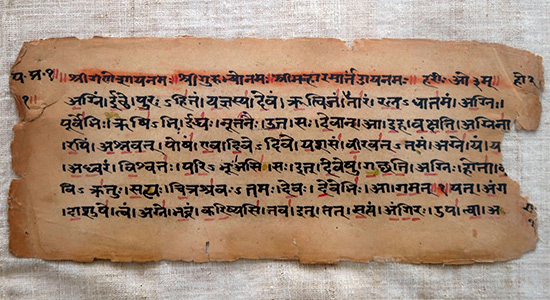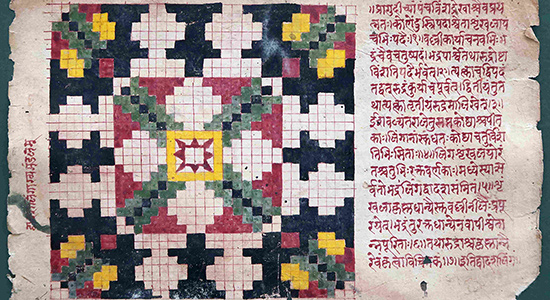Kenneth G. Zysk Indological Manuscript Collection
The collection consists of approximately 3000 Indic manuscripts collected from Brahmin families in the Varanasi area. The majority is from the 18th-19th centuries, some date back to the 15th-16th centuries. Most genres of Sanskrit literature are represented, but the collection is especially strong within the genres of ritual, law, and astral science.

The majority of the collection manuscript was written on country-made paper. Some were written on palm leaves. The language is predominantly Sanskrit, including a sizable portion of manuscripts written in various forms of Old Hindi. Most genres of Sanskrit literature are represented, but the collection is especially strong within the genres of ritual, law, and astral science.

The collection was donated to ToRS by Kenneth G. Zysk in 2020 and is currently being examined. We are working on a handlist that is meant to provide preliminary information about individual manuscripts as they are being examined. It will be updated in batches as and when we finish them.
See handlist-in-progress.
A preliminary examination of some 600 manuscripts in the collection provides information about the provenance of the subcollections to which they belong. See Subcollections below.
A preliminary examination of some 600 manuscripts in the collection provides information about the provenance of the subcollections to which they belong.
One subcollection of about 150 manuscripts belonged to Vijayānand Tripāṭhī (1881-1955) from Tulsi Ghat, Varanasi, who was a famous commentator on the Rāmcaritmānas. Several of his manuscripts appear to have been originally copied and owned by a certain Bhāgavad Dās who probably lived in Varanasi around the middle of the 19th century,
Another subcollection of more than 200 manuscripts derives from families in Utter Pradesh and Bihar, with special emphasis on the districts around Varanasi, Allahabad, and Ghazipur. Several manuscripts can be attributed to the hands of two scribes from Ghazipur. Gusāmī Gulābgīr lived in the first half of the 19th century, as evidenced by manuscripts dated between 1802 and 1839, while Bholānāth Pāṇḍe lived in the second half of the 19th century, as evidenced by manuscripts dated between 1861 to 1885.
A third subcollection, also consisting of above 200 manuscripts, comes from a family in the Mithila region of Bihar. The principal focus of the collection is Dharmaśāstra, indicating a connection in the family to traditional Hindu law.
A further subcollection was acquired from Chowkhamba in Varanasi, one of the oldest publishers of printed editions of Sanskrit texts. The manuscripts provide a unique insight into the process of editing and publishing Sanskrit texts in the mid- to late 19th century. Some manuscripts are even accompanied by transcripts that were subsequently typeset and printed
A few rare and early manuscripts discovered in the collection deserve special mention:
- Aśvāyurveda by Gaṇa. A manuscript on the veterinary medicine of horses, dated 1635.
- Aṣṭāvavakrasaṃkhyākrama by Aṣṭāvakra. A manuscript on the philosophical system of Advaita Vedānta dated 1670.
- Allopaniṣad. A manuscript of a Hindu text devoted to Allah, dating from the first half of the 19th century.
- Uttaratāpanīyopaniṣad. A manuscript on Indian philosophy dated 1675.
- Kālanirṇayaprakāśa by Rāmacandra. A manuscript on Indian law and astral science dated 1618.
- Jñānadharmāpta by Jayakṛṣṇabrahma. A manuscript on Yoga from the first half of the 19th century.
- Jyotiṣasarvasaṃgraha. A manuscript on astral science dated 1815.
- Nāḍīparīkṣa by Ravaṇa. A manuscript on Indian pulse-lore dated 1888.
- Brahmalakṣaṇavākyārthasaṃgraha by Śivokopa Muni. A work on the philosophical system of Vedānta.
- Brāhmaṇasarvasva by Halāyudha. A manuscript on law dated 1718.
- Bhāgavatakathāsaṃgraha by Keśavaśarman. A manuscript on Indian legend and folklore dated 1850.
- Bhṛgusaṃhitā by Bhṛgu. A manuscript on Indian astrology from the late 18th century.
- Yogasūtra of Patañjali, with the Yogadarpaṇa commentary of Dāmodarasarma. A manuscript on Yoga from the early 19th century.
- Vṛttaratnākara by Kedārabhaṭṭa, with commentary. An early manuscript on prosody dated 1649.
- Vedāntasiddhāntamuktāvalī of Prakāsānanda with the Muktāvalīṭīkā commentary by Nānādīkṣita. A manuscript on Indian philosophy from the early 19th century.
- Vratapaddhati by Rudradharaśarman. A manuscript on law written in Newarī script in the 16th century.
- Śyainikaśāstra by Rudracandradeva, the Mahāraja of Kūmaracala. A manuscript on Indian falconry from 1836.
- Sarvasaṃgraha by Narottama. A manuscript on astral science.
SAMHiTA, the Sanskrit word for “compilation” or “compendium”, is the acronym of a project proposed by the International Research Division, India International Centre (IIC-IRD), Delhi, to create a digital repository, called South Asian Manuscript Histories and Textual Archive. The idea is to initiate an international collaboration, consolidating information on South Asian manuscripts in collections outside India. The platform will host an electronic database, a body of searchable e-texts in different languages, and select digital images of significant manuscripts.
Read more at the SAMHiTA homepage.
Changing Episteme in Early Modern Sanskrit Astronomy (CEEMSA)
CSIS hosts Dr. AJ Misra's project CEEMSA, funded by the Gerda Henkel Stiftung from 1 Jan 2022 to 31 Dec 2023.
Critical Pali Dictionary (CPD)
A fully searchable online version of the Critical Pali Dictionary (CPD) originally prepared at the University of Copenhagen is now hosted at the University of Cologne.
Researchers
| Name | Title | Phone | |
|---|---|---|---|
| Sand, Erik Reenberg | Associate Professor Emeritus | +4551302699 | |
| Zysk, Kenneth Gregory | Professor Emeritus | +4551302624 |
